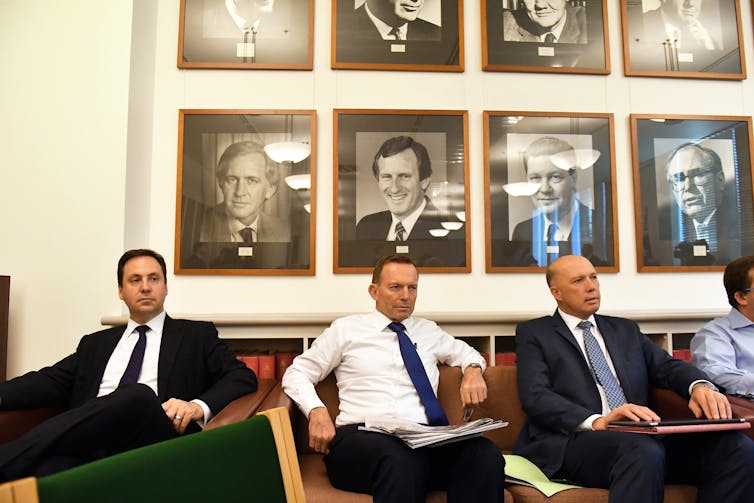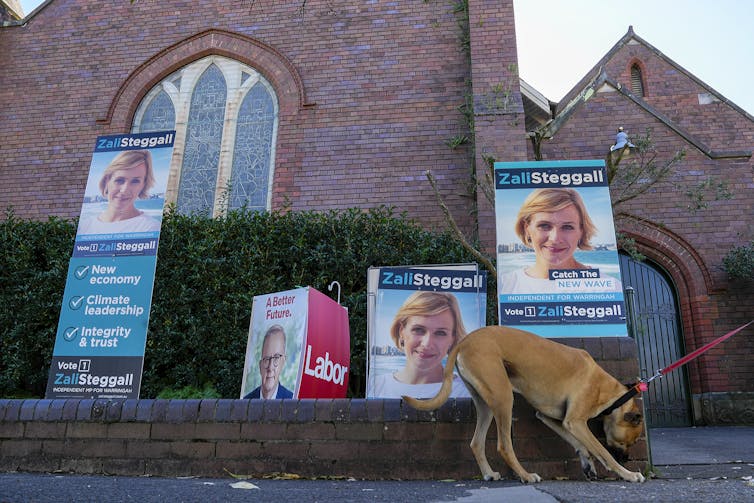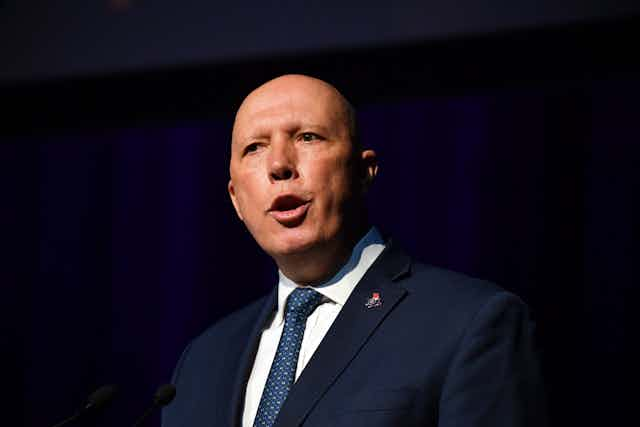Like former Prime Minister Scott Morrison, Peter Dutton found party stardom in the immigration portfolio. The two men’s contest for the leadership back in 2018 wasn’t the result of any huge demand for change among voters. It happened because they were popular within the Liberal Party’s base, or at least an influential section of it.
From the moment he arrived in parliament in 2007, Morrison had spent every waking hour plotting, manoeuvring and trimming his sails in pursuit of the top prize. Against Dutton, he presented himself as the candidate party moderates could tolerate.
Dutton, by contrast, seemed a what-you-see-is-what-you-get kind of guy. And what you saw was someone who takes seriously the esteem he attracts on Sky News After Dark and in other conservative media, and mistakes it for wider popularity. He’s big on borders and all they represent at an emotional level. Race is a particular, if veiled, theme.
Even more than most ambitious politicians, the member for Dickson also refuses to admit error. Indeed, he doubles down in the face of evidence to the contrary. Some voters are mightily impressed by this, but they tend to sit inside the party’s ideological echo chamber.
New leader, new approach?
As opposition leader, Dutton has forgone the expected “we must examine ourselves” self-flagellation and the ritual good wishes to the new government. Trying a different approach isn’t necessarily bad, of course, given the brutal fate of first-off-the-rank leaders. The prime example of that endangered species is Brendan Nelson, leader for less than a year in 2007–08; the Liberals’ two previous post-loss leaders, Andrew Peacock and Billy Snedden, only managed around two years each.
Read more: How did the polls perform in the 2022 election? Better, but not great; also a Senate update
Dutton is also ignoring the “move to the centre” nagging directed at all major parties after an election loss. That’s okay too, except the former Queensland policeman is actually rather right-wing, and he seems to believe that, deep down, so is the electorate – the plan being to return to power on the backs of suburban voters who share his values. Are there enough of them?
Better to “wedge” the opposition? John Howard used to ruminate on nuclear energy in the hope of splitting Labor. The current Liberal leader evidently believes the issue can divide the new government. But just wait for the controversy if he ever divulges where those reactors are likely to be.

In government, it was Dutton in particular who talked up the threat of war with China, and voting patterns suggest it inflicted much damage on the Coalition among Chinese-Australians. Still, it might have assisted the party elsewhere. Transgender fears, repeatedly injected into the campaign by Morrison, could also have worked both ways: a plus among the socially conservative religious cohort but a disaster on the “teal” front.
But Dutton will have to get used to the fact the new government – not the Coalition – now has the allure and prestige of power. There’s only so much tub-thumping he can do without looking isolated and pitiable.
Back to the future?
Among Dutton’s supporters, the template is Tony Abbott, so effective as opposition leader in landing blows on the Rudd government. But Abbott came to the job with an election due within a year and his position totally secure. He was assisted massively by the global financial crisis, the consequent debt and deficits, and a Labor machine that thought changing leaders five minutes before an election was clever. And Rudd himself, obsessed with his own poll ratings, was so unpleasant to so many colleagues that many of them jumped at the chance to dump him.
Could Labor snatch defeat (or at least a 2010-style tied election) from the jaws of victory again? Of course it could.
Anthony Albanese has never enjoyed anything like Rudd’s popularity and probably never will, which should help keep his feet on the ground. The dynamic that applies to almost all changes of federal government, but is sometimes buried under the hype around rockstar leaders like Rudd and Bob Hawke, was particularly obvious to all this time: Labor won largely because people wanted to get rid of the government and the opposition wasn’t too threatening.
But a corollary of this lesser-of-two-evils seesaw is the decline in support for both major parties. That long-term trend took a huge leap last month, spilling over into a more than doubling of “others” in the lower house. The teals’ insurgence was easily the most history-making component of the election.

On past experience, federal and state, Labor will have trouble retrieving real estate from the Greens. And of the two independents in left-wing seats, Andrew Wilkie has Clark for as long as he wants, though the fate of Dai Le in Fowler is less certain.
For the Liberal Party, the teals, in some of the bluest, highest-income electorates in the country, might or might not have staying power. If they end up being viewed as independents by voters, then perhaps the experience of Ted Mack in North Sydney (from 1990 to his retirement in 1996) beckons. But if they’re seen as a quasi-party the precedent is not so clear. Missteps by some might stain all of them.
Read more: Hawke's special skill was levelling with the Australian people. It's Albanese's only option
All governments are largely hostage to the economy. With experts telling us a recession is a distinct possibility, even Dutton could last full term against a weakened government. To regain office, he’d rely on voters who supported the Morrison government last month, particularly in the outer-suburban “middle”. But what if their loyalty was not to the Coalition itself, but to the safety of sticking with the incumbent in uncertain times?
Losing the outer suburbs at the next election without regaining the teal seats would be the nightmare scenario for the Coalition, whoever is leading it.
Back in 2013, your correspondent opined that “one day Australia’s two-party system might break. If it happened today, the ALP would shatter, but if it happens in five or ten years’ time, it might be the conservative parties.”
Did that occur on May 21? We will have to wait for the next election to find out.

